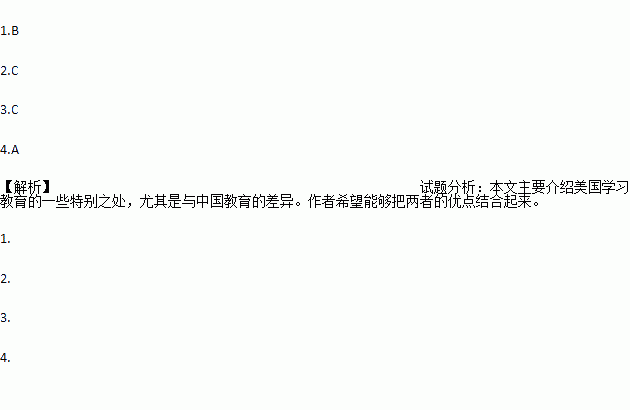题目内容
What are American high schools like? Well, I’m happy to tell you what I know.
When I started school here, it had already been a week since the school opened. At this school, freshmen usually go on a trip for about three days at the beginning of school. Unfortunately I missed that wonderful trip, which would have been the best time to get to know my classmates. I was really sad. I wished I’d known about it earlier.
Despite the disappointment, however, I gradually adapted to my new life and school.
There is a space in the basement of the teaching building where students chat and meet each other. As we do not always have the same classrooms and classmates, the school wants us to get to know each other there. Students usually come to school early, sit in that space and have fun. Around the space, there are many lockers for students to leave their books in, so that students do not have to carry a heavy schoolbag everywhere.
It really surprises me that we have almost no textbooks. We only have textbooks for World History and Algebra 2 and they are big and heavy, like bricks. For other classes, we only need binders (活页夹) with paper in them. Without textbooks, students learn things freely and actively. For example, my humanities teacher just teaches us what is in her mind at the time. We never know what we will learn.
Another difference between American schools and Chinese schools is that American schools care about students’ morality more than their academic studies. For example, if you do not finish your homework, you will just be asked to do it later, but if you cheat or lie, you will get a warning or even be kicked out.
I think that most students here are good at schoolwork as well, but compared to Chinese students, they can make learning a more joyful experience. I think we should take the good points from our two different kinds of education to perfect our approach to studying.
1.What was the writer sad for?
A. He was late for school.
B. He missed the trip at the beginning of school.
C. He didn’t know anyone.
D. American students looked down upon him.
2.Why do students go to the basement of the teaching building?
A. To attend class. B. To share a classroom.
C. To have fun. D. To meet teachers.
3.How do teachers in the US teach the students?
A. However they want to. B. They use bricks.
C. Some use textbooks; some teach freely. D. They always teach as required.
4.According to the passage, in American high schools, ________.
A. you are likely to be kicked out if you cheat
B. you’ll be punished if you do not finish your homework
C. students are better at school work than Chinese students
D. students care much about the grades they get

